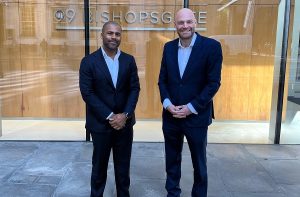Funding gap: Why female entrepreneurs are still paying the price

This International Women’s Day, the issue of access to finance for female entrepreneurs remains a critical topic.
While women-led businesses contribute significantly to economic growth, employment and innovation, many still face barriers when it comes to securing funding.
Gender disparities persist in business and financial services, making it harder for women to access the investment they need to grow their ventures.
Thebusinessdesk.com heard from Sophie Dale-Black, founder of SDB Innovation and co-founder of Spoken Velo and Natalie Gasson-McKinley MBE, from the British Business Bank.
Sophie Dale-Black believes International Women’s Day is an opportunity to reflect on both progress and ongoing challenges, particularly in securing funding.
She said: “History reminds us how long women have had to fight for recognition. Close to my heart, as my research career was in her specialism of X-ray crystallography, Rosalind Franklin’s pivotal contribution to DNA’s structure was overlooked for years, despite its profound impact on science.

Dr Sophie Dale-Black
“A perhaps less well-known role model, but equally stark, is Mary Harris Smith, the first female Chartered Accountant, who applied for membership of ICAEW repeatedly for nearly 30 years before finally being admitted in 1920.”
Dale-Black stressed that despite the progress we have seen, access to funding remains unequal.
“Similarly, women founders still struggle to secure funding, often receiving less investment than men. There has been growth in the share of equity investment into businesses led by mixed male and female teams (18.0% in 2024 compared to 9.5% in 2014).
“But in the first half of 2024, women-led businesses secured 1.8% of equity investment—the equivalent of 1.8p in every £1 invested—a proportion that has barely moved in more than 10 years.”
The disparity is particularly striking given that research suggests women-led businesses often deliver stronger returns.
“This statistic jars with data clearly showing that women-led businesses deliver higher returns and stronger growth, with £250bn to potentially be added to the UK economy if women started and scaled businesses at the same rate as men.
“There are, however, encouraging signs of change, with many positive interventions such as the Investing in Women Code and the Women Backing Women campaign, plus the £255m Invest in Women Taskforce funding coming onstream soon, to name just a few.
“Initiatives like Lifted Ventures are creating women angel investment networks and providing training for women wishing to become angel investors, ensuring more capital reaches female founders.”
Beyond investment, lending patterns also show gendered differences.
“Gender balance in access to lending receives less headlines, despite similarly positive interventions—40% of Start Up Loans and over 40% of lending by community development finance institutions go to women-led businesses.
“But, more generally, data shows that women-led businesses are less likely to use bank loans, overdrafts, credit cards, and leasing/hire purchase options—alongside a lower overall awareness of invoice finance. Female-led brokerage firm Female Founder Finance is just one example of an organisation dedicated to addressing this awareness and opportunity gap.”
For Natalie Gasson-McKinley MBE, the funding gap isn’t just a gender issue but an economic one.
She said: “The funding gap for female entrepreneurs is not just a women’s issue, it’s a missed opportunity for our economy. High-growth businesses are critical to our economic progress, yet many promising ventures led by women and other underrepresented groups struggle to access the capital they need.”

Natalie Gasson-McKinley MBE
Gasson-McKinley points to the stark statistics surrounding venture capital investment.
“For example, all-female teams receive only 3% of venture capital funding, while mixed-gender teams secure just 18%. These figures highlight the systemic barriers that still restrict access to vital investment.
“Moreover, the investor pool lacks diversity, with only 14% of angel investors being women and just 10% coming from Black, Asian, or minority ethnic backgrounds—most of whom are concentrated in London. Such imbalances mean that considerable talent across the UK remains untapped.”
She stressed that a more diverse investment landscape could be the key to unlocking potential.
“To unlock the nation’s full potential, it is essential to broaden the diversity of both the entrepreneurs seeking funds and the investors providing them. Diverse investors can offer fresh perspectives and are more inclined to support diverse businesses.”
With International Women’s Day as a backdrop, she urges investors to take action.
“This International Women’s Day, I’d encourage investors to sign up to the Investing in Women Code and review their investment strategies. By aligning capital with the diverse talent of our communities, we can build a more balanced, sustainable, and inclusive economy.”
International Women’s Day serves as an important reminder that while celebrating progress is crucial, so is the need for continued action.
The momentum for change is building, but the challenge now is to sustain and accelerate it.
Achieving financial equality in entrepreneurship is not just about fairness – it’s about unlocking untapped potential, driving innovation and strengthening the economy for everyone.









